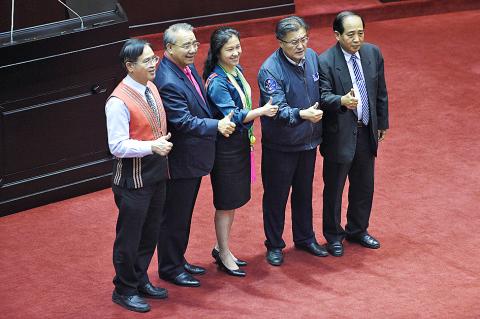The Aboriginal Language Development Act (原住民族語言發展法) yesterday passed its third reading at the Legislative Yuan, granting official status to Aboriginal languages.
Local governments, Aboriginal regions and non-Aboriginal areas with more than 1,500 Aborigines should establish an office tasked with the promotion of local languages, the regulations say.
The act stipulates that the central government should help establish organizations to promote Aboriginal languages, as well as chair meetings with each of the recognized communities to ascertain what new words should be incorporated, assist in compiling Aboriginal dictionaries and establish online linguistic archives.

Photo: Chen Chih-chu, Taipei Times
The primary goal of the policy is to encourage the learning of languages that are nearly extinct, regularly hold polls to gauge language learning, hold free exams and award Aboriginal language certificates, lawmakers said.
Within three years of the act’s promulgation, Aborigines taking civil servants’ special exams and those studying abroad on public funds would be expected to have an Aboriginal language certificate, the act says.
When hiring staff in accordance with the Indigenous Peoples Employment Rights Protection Act (原住民族工作權保障法), the government and public schools should prioritize people who speak Aboriginal languages, it says.
Government institutions, public schools and corporate entities in Aboriginal areas would be required to prepare official documents in commonly used languages of the area, while all public transportation in Aboriginal areas would be required to use the languages in announcements, the act says.
When conducting official business, standing trial in court or during any other judicial procedure, Aborigines would be allowed to use their own language to express themselves, and in such cases the government would have to hire an interpreter, it says.
All schools should follow the curriculum as set out according to the 12-year national basic education and provide Aboriginal language courses, it says, adding that such courses should be taught in Aboriginal languages.
Local education bureaus and departments should launch programs to train full-time Aboriginal-language teachers.
The government should set aside funds to promote Aboriginal-language publications, while state-run media should produce programs and language courses, the proposed rules say.
Air time for Aboriginal-language content in government-owned or government-invested media should not be less than 50 percent, it says.
The government officially recognizes 16 Aboriginal groups: Amis, Tao, Paiwan, Bunun, Puyuma, Thao, Atayal, Saisiyat, Tsou, Rukai, Kavalan, Sakizaya, Sediq, Hla’alua, Kanakanavu and Truku.

The Mainland Affairs Council (MAC) today condemned the Chinese Communist Party (CCP) after the Czech officials confirmed that Chinese agents had surveilled Vice President Hsiao Bi-khim (蕭美琴) during her visit to Prague in March last year. Czech Military Intelligence director Petr Bartovsky yesterday said that Chinese operatives had attempted to create the conditions to carry out a demonstrative incident involving Hsiao, going as far as to plan a collision with her car. Hsiao was vice president-elect at the time. The MAC said that it has requested an explanation and demanded a public apology from Beijing. The CCP has repeatedly ignored the desires

Many Chinese spouses required to submit proof of having renounced their Chinese household registration have either completed the process or provided affidavits ahead of the June 30 deadline, the Mainland Affairs Council (MAC) said on Thursday. Of the 12,146 people required to submit the proof, 5,534 had done so as of Wednesday, MAC deputy head and spokesperson Liang Wen-chieh (梁文傑) said. Another 2,572 people who met conditions for exemption or deferral from submitting proof of deregistration — such as those with serious illnesses or injuries — have submitted affidavits instead, he said. “As long as individuals are willing to cooperate with the legal

The Ma-anshan Nuclear Power Plant’s license has expired and it cannot simply be restarted, the Executive Yuan said today, ahead of national debates on the nuclear power referendum. The No. 2 reactor at the Ma-anshan Nuclear Power Plant in Pingtung County was disconnected from the nation’s power grid and completely shut down on May 17, the day its license expired. The government would prioritize people’s safety and conduct necessary evaluations and checks if there is a need to extend the service life of the reactor, Executive Yuan spokeswoman Michelle Lee (李慧芝) told a news conference. Lee said that the referendum would read: “Do

The Ministry of Environment yesterday held a seminar in Taipei for experts from Taiwan and Japan to exchange their experiences on the designs and development of public toilets. Japan Toilet Association chairman Kohei Yamamoto said that he was impressed with the eco-toilet set up at Daan Forest Park, adding that Japan still faces issues regarding public restrooms despite the progress it made over the past decades. For example, an all-gender toilet was set up in Kabukicho in Tokyo’s Shinjuku District several years ago, but it caused a public backlash and was rebuilt into traditional men’s and women’s toilets, he said. Japan Toilet Association